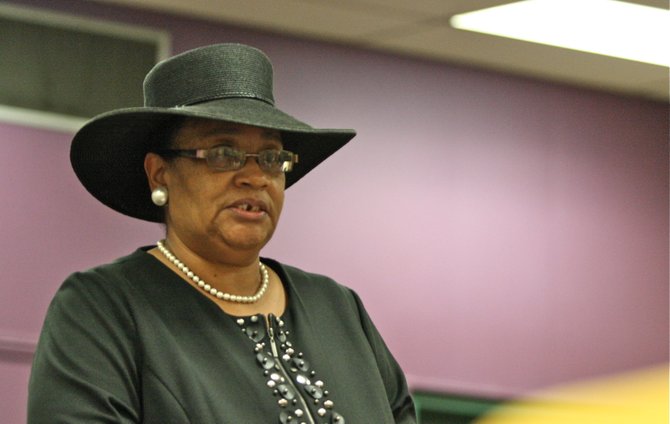LaRita Cooper-Stokes wants the city to reenact a curfew for minors, but she has neither the law nor fellow council members on her side. Photo by Jacob D. Fuller.
After years of supporting a city curfew for minors, but having no facility in which to hold them, the Jackson City Council’s discourse appears to be changing on the subject of what to do with young people after dark.
Most of the council’s planning committee agreed with local ACLU leaders that a city curfew that sends youth violators to jail is not only a bad idea, but one that could land the city in serious trouble with the state.
Und er the city’s former curfew, no one under 18 was allowed to be in any public place in the city between the hours of 10 p.m. and 6 a.m. on weekdays, and midnight and 6 a.m. on Fridays and Saturdays. If police picked up violators, they took the minors to Henley-Young Youth Detention Center.
State law now prohibits municipalities from holding status offenders, such as curfew violators, in the same facility as criminals, such as burglars or murderers. A consent decree from the state also prevents the city from creating any new conditions which would send juveniles to Henley-Young, Deputy City Attorney James Anderson said at a Oct. 4 Planning Committee meeting. A curfew would be a new condition, he said.
That leaves the city with the question: If we reinstate the curfew, where do we take the kids?
Planning Committee Chairwoman LaRita Cooper-Stokes of Ward 3 brought the curfew back into discussion at the committee meeting. Her husband, Kenneth Stokes, has long been a youth-curfew proponent and proposed re-adopting the city’s former curfew, which expired in 2009, when he was the Ward 3 councilman. The ordinance has been in the Planning Committee since 2010.
Ward 4 Councilman Frank Bluntson, a former proponent of the city curfew and former director of the local youth detention center, even seemed to change his tone on the subject. He indicated that he is open to listening to other council members’ proposals to create places such as youth centers for children to go at night.
Council President Tony Yarber of Ward 6 said he has seen no data that show city curfews work. Little to no conclusive data shows a positive affect of curfews on juvenile crime, despite 78 of the 92 cities nationwide with a population of 180,000 or more currently having youth curfews. In fact, a 1999 study by the Justice Policy Institute of the Center on Juvenile and Criminal Justice found that when data showed a discernible difference: the cities that most strictly enforced a curfew also had the highest juvenile crime rates.
Yarber said he was glad Cooper-Stokes brought the discussion to the table and was excited to hear that the current city council is interested in entertaining new ideas. He wants to see the city find alternative solutions to youth being on the street with nothing to do at night. The city needs to redirect some funds to address the problem, he said. He and Ward 5 Councilman Charles Tillman have been researching the city opening an activity center to take children instead of jail.
An even more proactive approach, Yarber said, would be opening activity centers to give all children a fun, safe place to go at night.
Mississippi ACLU Legal Director Bear Atwood and Program Director Nancy Kohsin-Kintigh both spoke at the Planning Committee Oct 4. Kohsin-Kintigh said minors have the right to be out anytime of night, just like adults do.
“I understand parents are frustrated, but so are young people. There’s nothing to do. There’s no places for them to go,” Kohsin-Kintigh said. “If we created that space, we will see some very positive things coming out of that.”
Cooper-Stokes’ only reaction to Kohsin-Kintigh’s comments was to ask Kohsin-Kintigh if she has any children, to which she answered, “No.”
“We send a little over $1.2 million (to the county) every year to fuel the juvenile-justice piece that we have,” Yarber said, adding that some of that money should go into athletic, arts and other programs for children. That would be true pro-activity on the part of the city in preventing youth crime,
Yarber said.
Atwood wants to see the city include parent support services and discussions with youth and parents to the solution process. She said the answer isn’t just getting children off the streets, because then they’ll just act up at home.
“(Parents) are in a tough situation,” Atwood said. “I really hope that we’ll bring parents into the conversation.”
There are also problems with creating another facility to house juveniles who violate a curfew, Anderson said. Youth Court Judge William Skinner would have to approve a new facility to house curfew violators and the city would have to worry with many levels of state and federal requirements for the facility.
In previous years, the council has proposed taking the children to a church, but legal counsel has advised them that is illegal to bring a third party, such as a church, in to house the children.
The Planning Committee will discuss the curfew at a public meeting at City Hall Oct. 25 at 6 p.m. The next Planning Committee meeting is scheduled for Oct. 29 at 3 p.m.



Comments
Use the comment form below to begin a discussion about this content.
comments powered by Disqus